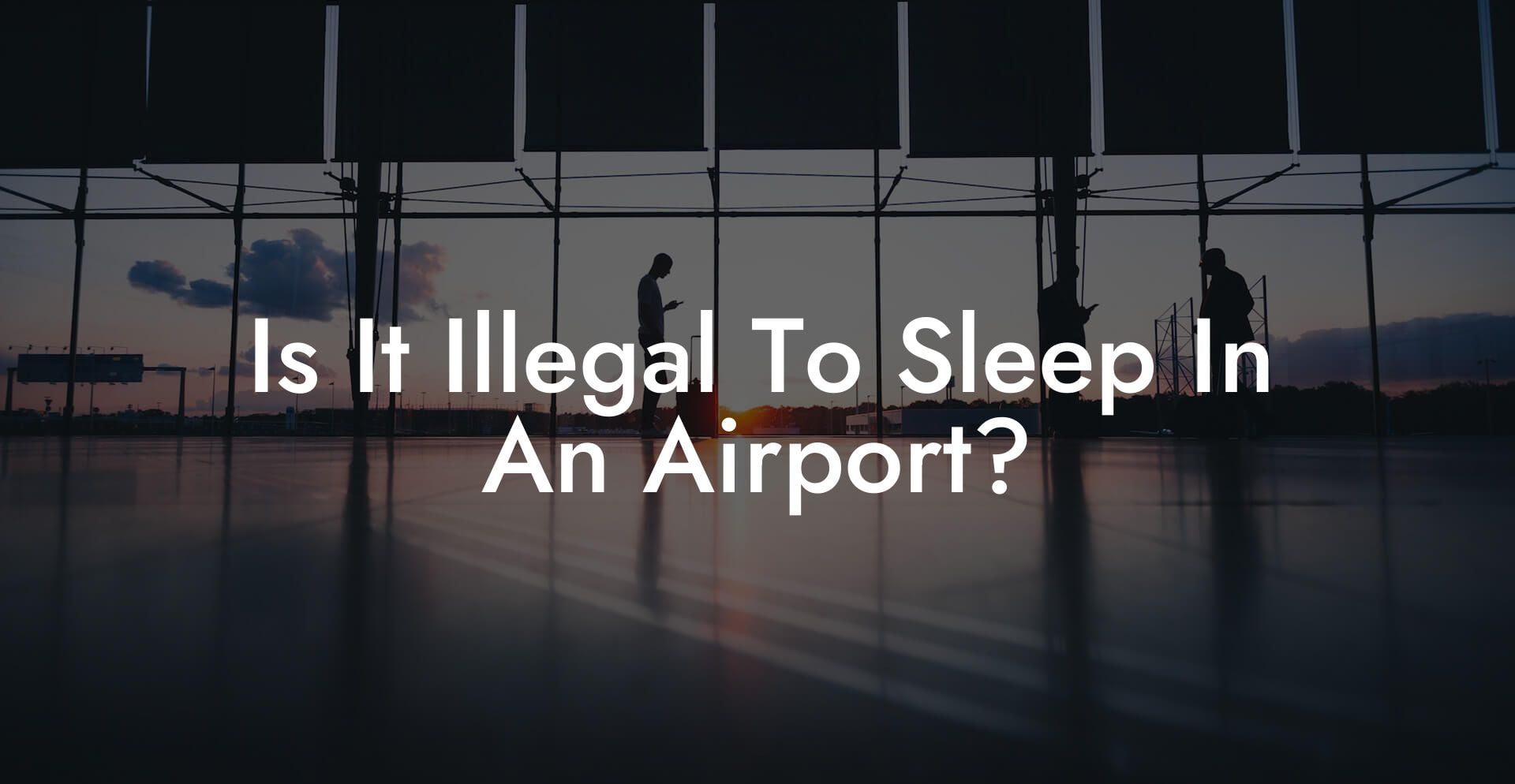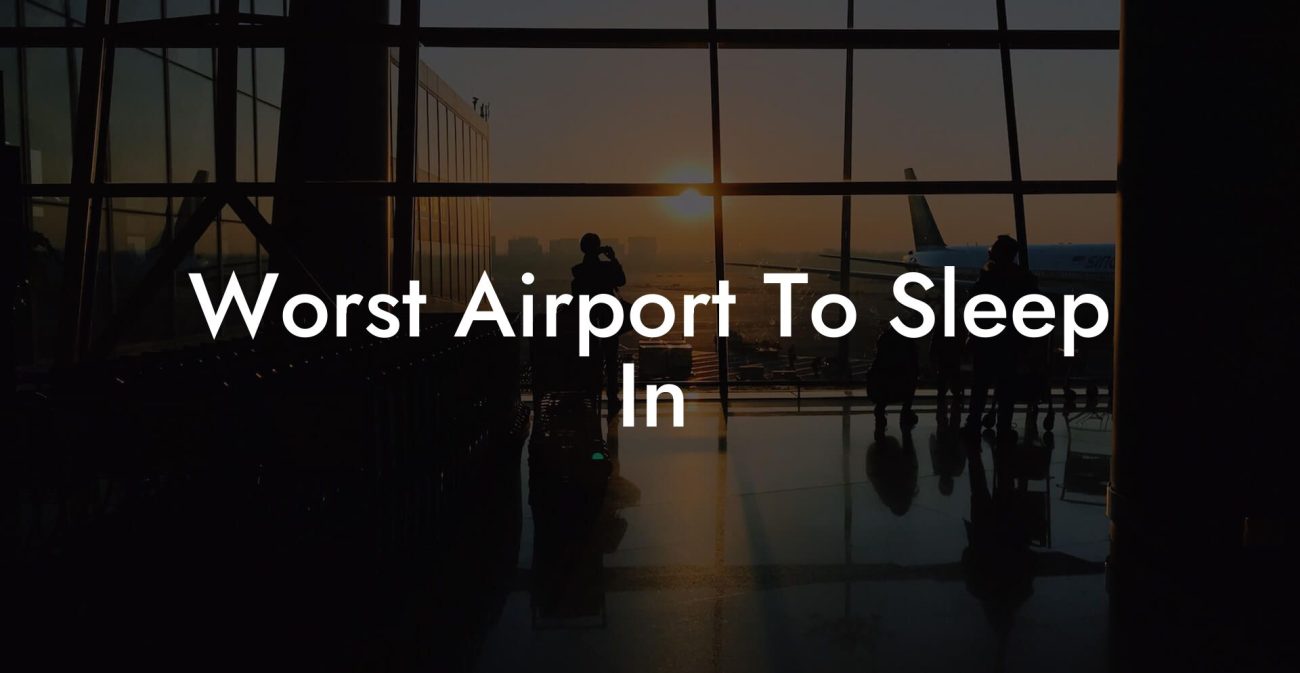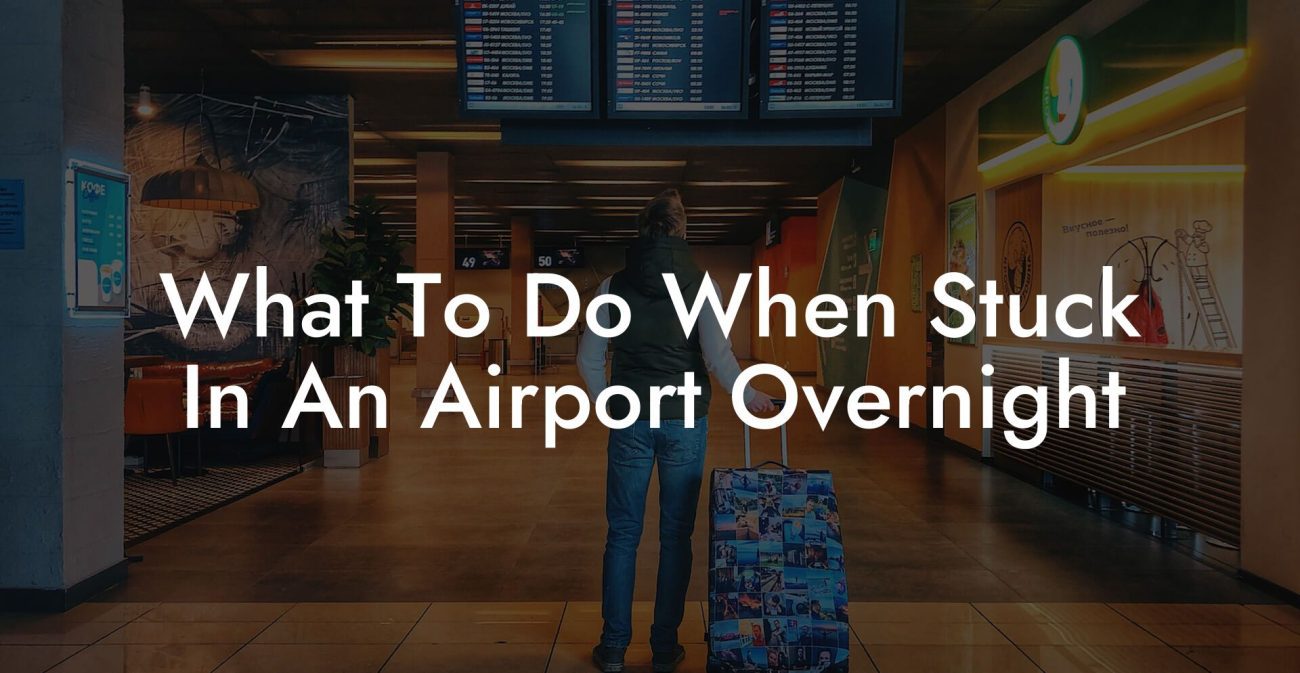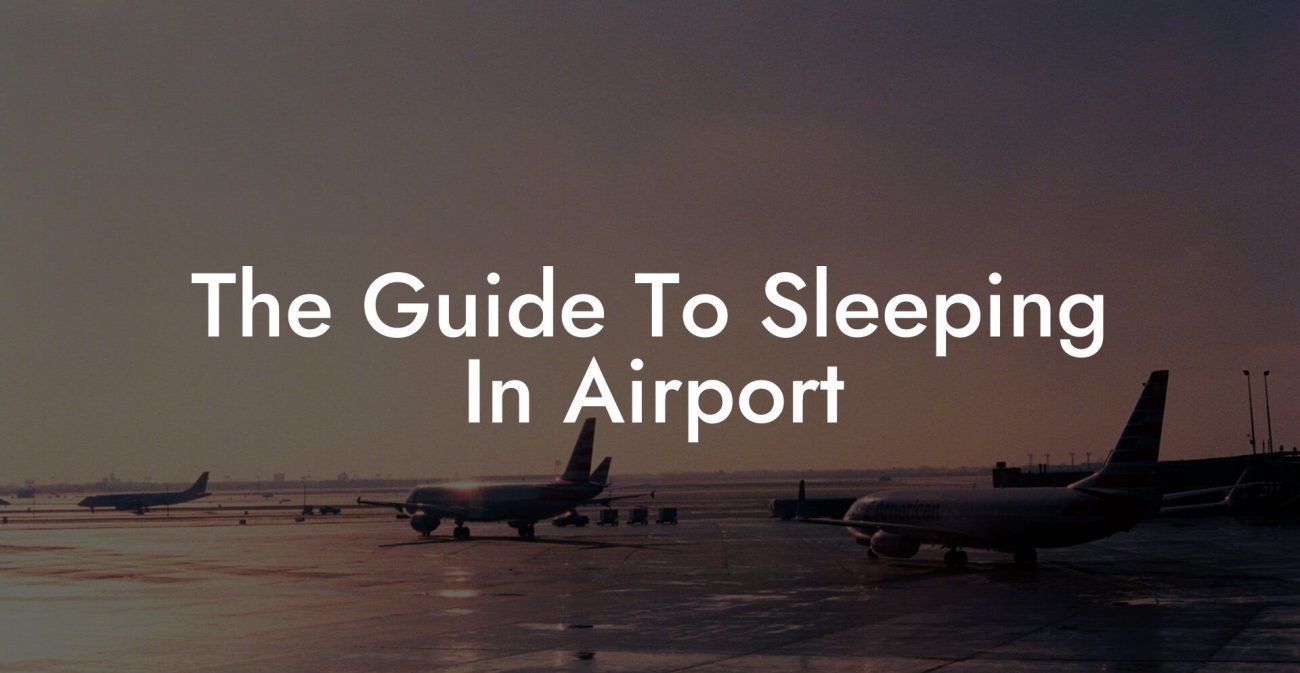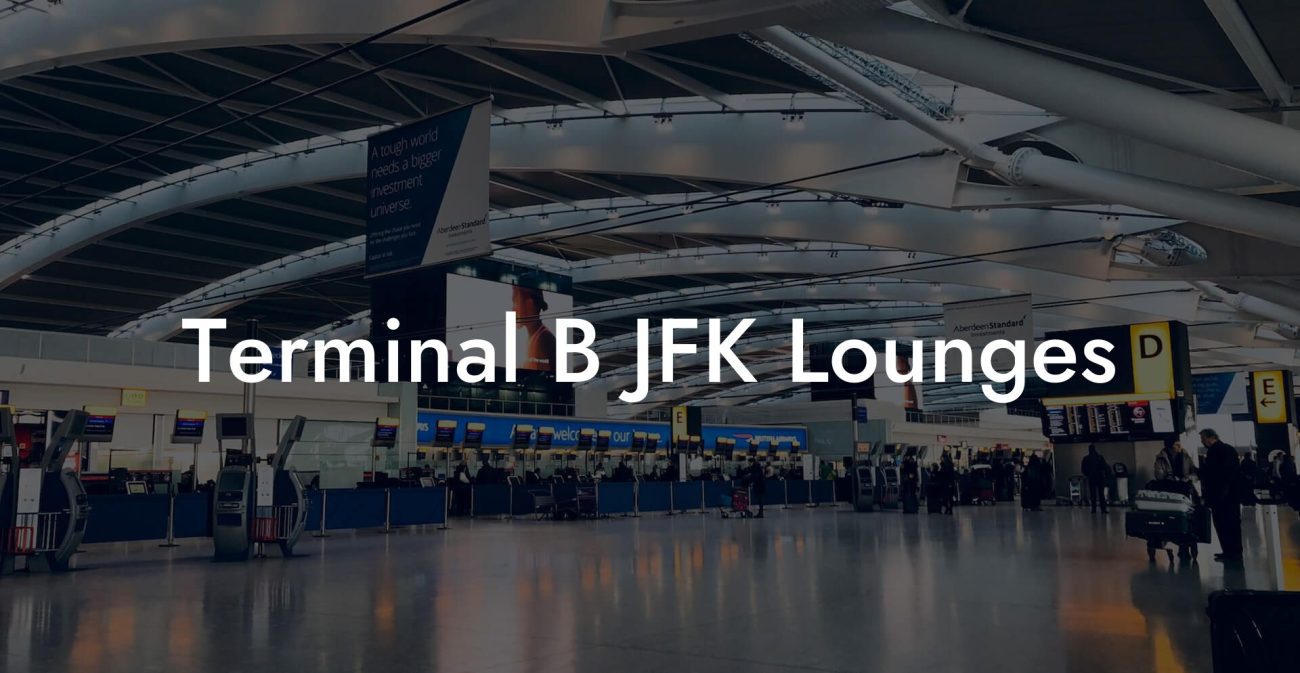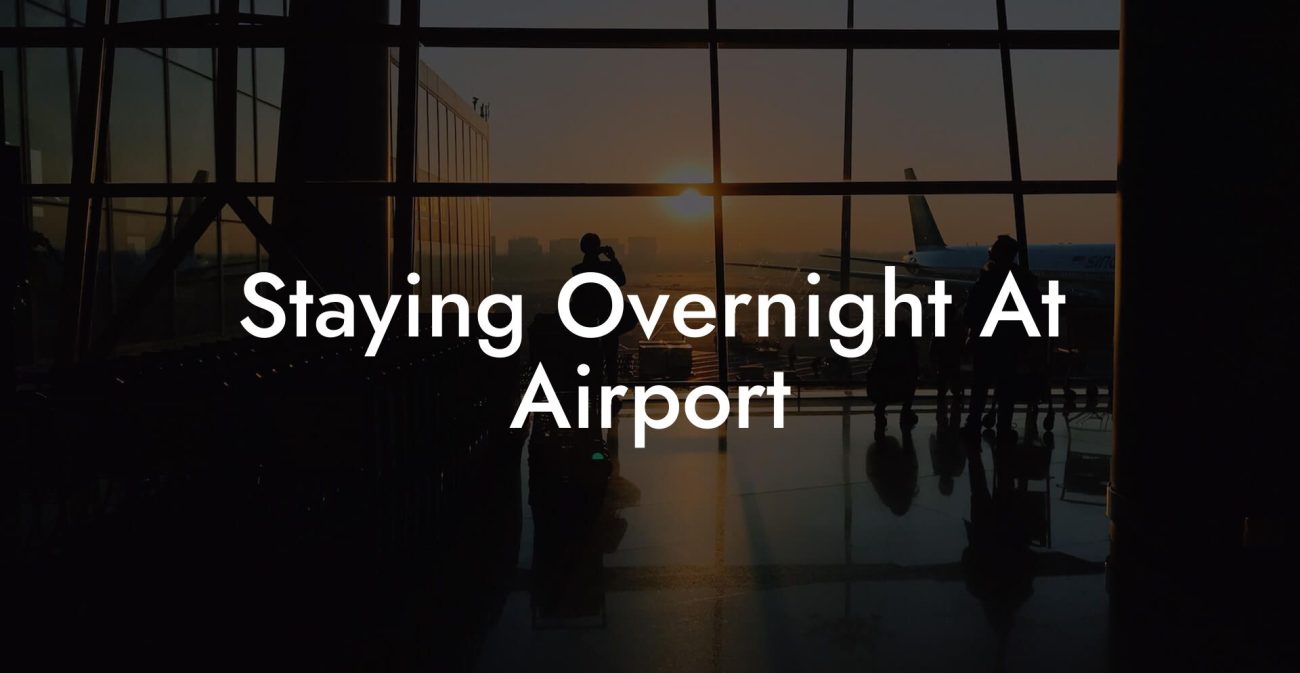Ever wondered if catching some Z’s in an airport is a sweet, harmless hack or a ticket to a legal headache? Let’s dive into the ins and outs of airport sleeping—from cramped benches to ultra-modern sleeping pods—and answer the burning question: Is it illegal to sleep in an airport? Whether you’re a jet-setting millennial or a Gen-Z nomad, our guide has the lowdown, savvy tips, and a healthy dose of humor to help you navigate the terminal terrain like a pro.
Quick Links to Useful Sections
- Understanding the Legality of Airport Snoozing
- Airport Policies: A Closer Look at the Do’s and Don’ts
- Exploring Airport Sleeping Pods: The Future of In-Transit Napping
- The Pros and Cons of Airport Sleeping: Making an Informed Decision
- Pros of Sleeping in an Airport
- Cons of Sleeping in an Airport
- Decoding Local Regulations and Airport-Specific Rules
- Creative Tips and Hacks for a Quality Airport Sleep Experience
- The Ultimate Airport Sleep Survival Kit
- Finding the Best Sleeping Spots
- Staying Safe and Respectful
- Sleeping in an Airport: Real-Life Stories and Experiences
- The Accidental Campout in Terminal B
- The Luxe Upgrade: A Tale of a Sleeping Pod
- The Cautionary Tale of the Overstaying Traveler
- Technology and Apps: Enhancing Your Airport Sleep Experience
- Airport Lounge and Sleep Spot Finders
- Alarm and Sleep Cycle Trackers
- Travel Forums and Social Media Groups
- How to Legally Maximize Your Rest on the Go
- Tips for Selecting the Right Airport for a Restful Layover
- Resources and Community Support: Your Next Steps
- Adapting Your Airport Sleep Strategy to Different Travel Scenarios
- Short Layovers: The Power Nap Approach
- Long Layovers and Overnight Delays
- Transit Through Remote or Budget Airports
- Airport Sleeping: Debunking Myths and Common Misconceptions
- Myth 1: “Sleeping in an airport is always frowned upon”
- Myth 2: “Airport sleep equals homelessness”
- Myth 3: “You’ll always be escorted out or fined”
- FAQ: Your Airport Sleep Questions Answered
- Your Flight to a Restful, Empowered Tomorrow
Understanding the Legality of Airport Snoozing
The legality of sleeping in an airport is a bit of a mixed bag. While there’s no blanket law that explicitly forbids catching some shut-eye at most airports across the globe, the rules can vary widely depending on where you are, the specific airport’s policy, and even the time of day. Airports are like mini-cities, each with its own set of guidelines that might consider sleeping as either a harmless pit stop or a potential security risk.
Many airports adopt a “mayor’s discretionary power” approach: if no one is around, you might be able to sleep on the floor without lifting an eyebrow. But if security is tight or if you’re in a busy terminal, airport staff could ask you to move along or even contact local law enforcement if they suspect you’re loitering. Remember that these rules aren’t about criminalizing sleep—they’re about ensuring safety, security, and accessibility for all travelers.
So, is it illegal to sleep in an airport? The short answer is no, in most cases it isn’t—provided you’re not blocking emergency exits, causing a disruption, or violating specific airport policies. The real challenge is decoding the unwritten rules of each airport and knowing your rights as a weary traveler.
In the following sections, we’ll explore airport policies, legal nuances, and practical tips that not only help you avoid unwanted encounters with security but also transform your airport catnaps into a strategically savvy travel hack.
Airport Policies: A Closer Look at the Do’s and Don’ts
Airports are built for one main purpose: ensuring that passengers move through security and boarding with minimal friction. As a result, many airport authorities have set policies that indirectly impact those who spend too much time sleeping in lounges, waiting areas, or even the baggage claim zone.
The Do’s:
- Do stick to designated rest areas: Some airports have specific “quiet zones” or lounges with comfortable seating and even recliners designed exactly for catching a quick nap.
- Do check the rules: Before you prepare your travel pillow for duty, read up on the airport’s website or ask an information desk about policies on overnight stays or extended waits.
- Do dress discreetly: Blending in with other travelers often keeps the focus off you as an “unusual” sleeper. A hoodie, a book, and headphones can work wonders.
- Do use airport sleeping pods: More and more airports are offering dedicated sleeping pods or mini-rooms that are a legitimate and comfortable way to catch some z’s.
The Don’ts:
- Don’t block walkways or emergency exits: This is a major security concern. Even if you’re deep in slumber, you could inadvertently cause safety hazards.
- Don’t set up camp: Sprawling out with your luggage, blankets, and a full spread of snacks in the middle of the terminal might get you noticed—for all the wrong reasons.
- Don’t ignore staff instructions: If an airport official asks you to move, it’s best to comply rather than argue over whether your snooze is “illegal.”
By following these simple guidelines, you can keep your airport sleep strategy both comfortable and unobtrusive.
Exploring Airport Sleeping Pods: The Future of In-Transit Napping
Gone are the days when the only option was to settle for a stiff seat or a cold floor. In recent years, the airport sleeping pod has emerged as a modern solution for weary travelers craving a more private and comfortable sleep experience. These innovative pods are designed with tech-savvy travelers in mind, blending convenience, security, and luxury in one ultramodern package.
What Are Airport Sleeping Pods?
In essence, airport sleeping pods are compact, often soundproofed compartments equipped with amenities like a charging station, adjustable lighting, and a comfortable sleeping surface. They offer a secure, hygienic space where you can recharge between flights, plus many of them can be booked by the hour.
Benefits of Sleeping Pods:
- Privacy: Unlike crowded waiting areas, pods provide a personal space where you’re less likely to be disturbed.
- comfort: With ergonomic designs, climate control, and even shower facilities in some locations, these pods are a luxury compared to traditional airport seating.
- Productivity: Some pods double as mini-offices, complete with Wi-Fi and charging ports, letting you work or relax in private.
- Security: Booking your pod in advance often provides you with a locked space that minimizes the risks associated with leaving your belongings in a public area.
Downsides to Consider:
- Cost: Not all airports offer free sleeping areas, and those with pods might charge hourly fees that can add up over long delays.
- Availability: In busy travel hubs, these pods can be booked well in advance, so plan ahead if this option appeals to you.
- Not Universal: While increasingly popular, many regional or smaller airports still lack these modern amenities.
If you’re looking to upgrade your airport sleep game and avoid the questionable comfort level of terminal benches, searching for an airport sleeping pod might just be your golden ticket.
The Pros and Cons of Airport Sleeping: Making an Informed Decision
When you’re stranded in an airport with hours to kill, you have a decision to make: is it worth it to try and sleep in the terminal? Let’s break down the advantages and potential pitfalls so you can decide based on your travel style and tolerance for inconvenience.
Pros of Sleeping in an Airport
Cost Efficiency: For budget travelers, staying in an overpriced hotel when you have a long layover just doesn’t add up. Utilizing airport facilities can be a money-saving alternative.
Convenience: There’s no need to leave the airport and go through security again if your layover is long. Staying put means less hassle, especially if your flight leaves later than expected.
Safety: Airports are typically well-lit and have security personnel on duty around the clock, which can be a reassuring factor for solo travelers or those unfamiliar with the destination city.
Access to Amenities: Even if you’re sleeping rough, most terminals offer restrooms, food options, and free Wi-Fi so you can catch up on emails or your favorite shows.
Cons of Sleeping in an Airport
Limited Comfort: Unless you opt for a sleeping pod or designated rest area, airport seating is rarely made for a good night’s sleep—think stiff chairs or cold floors.
Noise and Crowds: Airports are bustling hubs, and finding a quiet corner might be a challenge, especially during peak travel times.
Potential for Conflict: As laid-back as you might be, excessive sleeping in public areas can sometimes attract unwanted attention from security or fellow travelers.
Legal Grey Areas: As we discussed earlier, while sleeping isn’t illegal, improper placement or behavior can lead to trouble in certain airports.
Ultimately, the decision to sleep in an airport should be based on a balance between convenience, comfort, and compliance with local rules.
Decoding Local Regulations and Airport-Specific Rules
The legal status of sleeping in an airport can change from one country to another—or even one terminal to another within the same airport. Understanding these nuances is key to avoiding any unpleasant encounters with airport security.
In some European and Asian airports, for example, strict security protocols mean that overnight stays in public areas might be frowned upon. On the other hand, many U.S. airports tacitly allow sleeping in designated areas, especially if it’s clear you’re not causing a disturbance. A tip for savvy travelers: call ahead or browse online forums to see what experiences other night-owl voyagers have encountered.
It’s also important to consider the cultural context. In some regions, the idea of sleeping in a public space might carry a social stigma or be seen as a sign of homelessness, which could lead to uncomfortable interactions. Knowing the local attitudes and preparing a respectful, low-key demeanor can go a long way.
Always keep a copy of your boarding pass or reservation handy, as it may serve as proof that you’re simply in transit rather than trying to set up permanent residence in the terminal.
Creative Tips and Hacks for a Quality Airport Sleep Experience
If you’re determined to squeeze in some sleep between flights, it’s time to master the art of airport napping with tricks that even the savviest digital nomads swear by.
The Ultimate Airport Sleep Survival Kit
Noise-Cancelling Headphones: Block out the ambiance of rolling suitcases and chattering crowds with a pair of noise-cancelling headphones. Put on your favorite podcasts or a relaxing playlist to drift off.
Travel Pillow and Blanket: Invest in a comfortable travel pillow and a warm, compact blanket. Not only do they make a world of difference, but they also signal to security that you’re a prepared traveler rather than an unwelcome squatter.
Eye Mask: Block out harsh airport lighting and create your own little cocoon of darkness. A good-quality eye mask can be a game-changer for those early morning or late-night naps.
Portable Charger: Keep your devices juiced up so you can control your in-flight entertainment or research the next leg of your journey without panic.
Finding the Best Sleeping Spots
Not all airport corners are created equal. Some terminals have hidden gems—quiet alcoves, comfortable benches, or even dedicated nap zones. Do your homework by checking the airport’s map, travel blogs, and forums such as Reddit’s r/onebag or FlyerTalk where travelers share real-time updates on the best napping locations and any recent changes in policy.
Look for areas near less-trafficked gates, or even off the beaten path near service corridors that are open to the public during off-peak hours. Sometimes a little creative scouting can uncover a surprisingly cozy spot.
Staying Safe and Respectful
While your priority is catching some much-needed sleep, don’t forget your safety and the comfort of other travelers. Keep your valuables secure by using a money belt or a theft-resistant backpack. Maintain a low profile—avoid loud conversations or disruptive behavior—and always be polite if approached by airport security.
If you’re sharing a space with strangers, respect their privacy and do your best to leave the area as you found it. Being a considerate sleeper not only keeps you out of trouble but also helps create a positive atmosphere for fellow travelers.
Finally, consider setting an alarm so you don’t miss that crucial boarding call. A discreet bit of planning ensures that your rest doesn’t turn into a missed connection.
Sleeping in an Airport: Real-Life Stories and Experiences
Nothing illustrates the highs and lows of airport sleeping better than real-life experiences from our fellow jetsetters. Here are a few stories that shed light on the diverse world of transit naps:
The Accidental Campout in Terminal B
Alex, a freelance digital nomad, found himself with a 14-hour layover at a major European hub. With no lounge access and a budget that left little room for hotels, Alex opted for a spot near Terminal B. Despite the hustle and bustle, a quiet corner behind a row of shops served as his makeshift bed. He armed himself with a travel pillow, noise-cancelling headphones, and plenty of determination. While a friendly security guard eventually nudged him to move after noticing him inadvertently turning the corner into a nap zone, Alex’s experience highlighted the unpredictable nature of airport sleep—and the importance of knowing when to make a discreet exit.
The Luxe Upgrade: A Tale of a Sleeping Pod
Sophia, a frequent flyer and self-proclaimed “comfort seeker,” recently discovered the world of airport sleeping pods. Faced with a late-night departure at an ultra-modern hub, she decided to trade the unpredictable terminal chair for a booked sleeping pod. The pod was everything she hoped for: a discreet, secure space complete with ambient lighting, a charging station, and even a mini TV for entertainment. While the price tag was steeper than slogging it out on a bench, the added comfort and peace of mind made it well worth the upgrade. Sophia’s experience is a testament to the growing trend among travelers who value quality rest even in the midst of transit.
The Cautionary Tale of the Overstaying Traveler
Then there’s Jamal, who, after a delayed flight, unintentionally turned an airport lounge into his prolonged resting spot. What started as a one-hour nap quickly turned into an overnight session as his flight was repeatedly delayed. Despite the lounge being relatively relaxed about sleeping, Jamal’s extended stay eventually caught the eyes of airport personnel. He was politely asked to leave and advised to check in with local accommodations. Jamal’s story serves as a reminder that while short-term airport naps are typically fine, overstaying or camping out in public areas can trigger unwanted attention and even potential penalties.
These narratives emphasize that airport sleeping isn’t one-size-fits-all—it’s an evolving art that depends on timing, location, and a bit of strategic planning.
Technology and Apps: Enhancing Your Airport Sleep Experience
In the digital age, apps and tech tools can transform your airport sleeping game from “barely-sleepy” to blissfully recharged. Here are some digital aids to consider:
Airport Lounge and Sleep Spot Finders
Apps like Sleepytime, LoungeBuddy, and even Google Maps reviews can help pinpoint the best spots for napping—whether it’s a hidden lounge, an underused gate, or an official sleeping pod. These platforms are frequently updated by fellow travelers, ensuring you get real-time recommendations.
Alarm and Sleep Cycle Trackers
A reliable alarm clock app is more than a convenience—it’s a travel essential. Use sleep cycle apps that wake you up during a light sleep phase, so you avoid grogginess and can hop onto your flight with minimal disruption.
Travel Forums and Social Media Groups
Online communities like r/travel, r/solotravel on Reddit, or specific Facebook groups dedicated to budget travelers are treasure troves of firsthand experiences and updates on airport sleeping etiquette. These forums often feature advice on everything from the best sleeping pods to the quirkiest airport secrets.
Integrating these digital tools into your travel routine not only mitigates the stress of airport waits but adds an element of modern, tech-savvy convenience to your journey.
How to Legally Maximize Your Rest on the Go
Balancing comfort, legality, and productivity during long layovers requires a proactive, informed approach. Here’s your checklist for maximizing those Z’s while staying within legal and airport guidelines:
- Research in Advance: Before embarking on your journey, review the airport’s website for any specific sleeping policies or designated nap areas. Awareness is your first line of defense.
- Have a Backup Plan: Identify local hotels or nearby accommodations in case your plan to sleep at the airport hits a snag. Flexibility is key.
- Pack Essential Sleep Gear: Always travel with a compact travel pillow, sleep mask, and noise-cancelling headphones to transform any spot into a sleep haven.
- Keep It Low-Key: Choose nondescript attire and avoid drawing attention. Blend in with the crowd by keeping your gear organized and maintaining a calm demeanor.
- Maintain a Solid Itinerary: Regularly check your flight status and set discreet alarms. A well-planned schedule ensures you won’t oversleep or miss boarding announcements.
By following these tips, you can enjoy a legally sound, comfortable sleep without compromising airport security or your travel plans.
Tips for Selecting the Right Airport for a Restful Layover
Not all airports are created equal when it comes to facilitating a peaceful nap. Some airports invest in dedicated rest zones and even sleeping pods, while others may push you towards the exit if you’re spotted napping in the hallway. Here’s how to pick the right airport for your snooze:
Check Reviews and Forums: Before booking a flight, check travel websites and online forums for insights on the best airports to sleep in. Some hubs, like Singapore Changi and Seoul Incheon, are renowned for their comfortable amenities.
Evaluate Amenities: Look for airports that offer quiet lounges, sleeping pods, and options for shower or rest facilities. The presence of these amenities is a strong indicator of traveler-friendly policies.
Assess Security and Safety: A well-lit, busy airport might seem unsafe, but a secure, monitored environment with clear policies is generally a safer bet than an underserviced terminal with low foot traffic.
By choosing an airport that actively caters to transit passengers, you enhance your chances not only of a good night’s sleep but also of a stress-free travel experience.
Resources and Community Support: Your Next Steps
Ready to make the most of your airport snooze strategy? Whether you’re a casual traveler or a frequent flyer, tapping into the right resources can elevate your experience. Start by bookmarking hotel alternatives, downloading dedicated travel apps, and subscribing to travel blogs and forums that focus on budget travel and airport amenities.
Engage with community groups on social media where seasoned airport sleepers share up-to-date information, insider tips, and even alert you to temporary changes in airport policies. Local travel communities, such as Meetup groups or city-specific travel forums, can offer valuable insights into the best times and spots for a discreet nap.
Additionally, many travel websites now host comprehensive airport guides that include sections on sleep-friendly terminals. Explore websites like The Points Guy, One Mile at a Time, or Flight Deal Watch to stay informed on the latest airport lounge upgrades and sleeping pod installations.
Your next step is simple: prepare, plan, and connect. The more you arm yourself with advanced knowledge and the support of fellow travelers, the smoother—and refreshingly legal—your airport sleep experience will be.
Adapting Your Airport Sleep Strategy to Different Travel Scenarios
Whether you’re navigating a short layover, an unexpected delay, or even an overnight transit, adaptability is the cornerstone of a successful airport sleep strategy. Tailor your approach based on the situation at hand, from meticulously planning a brief nap to strategizing for a long haul delay.
Short Layovers: The Power Nap Approach
When faced with a quick layover, it might be tempting to double down on a full sleep cycle—but sometimes all you need is a strategic power nap to recharge. Find a quiet corner, set your alarm for 20–30 minutes, and avoid getting too cozy to prevent oversleeping. A power nap can sharpen your focus for the next leg of your journey without risking missing your flight.
Long Layovers and Overnight Delays
For travelers experiencing long waits or overnight delays, the stakes are higher. Here, your strategy should involve finding a secure, sheltered spot or booking an airport sleeping pod if available. As always, check local policies and know your rights. If the airport feels overwhelming, consider stepping out to a nearby hotel, hostel, or even a 24-hour café that welcomes night owls.
Transit Through Remote or Budget Airports
Not every airport comes with plush facilities or modern amenities. In more remote or budget-friendly airports, you might need to make do with limited comfort. In these cases, ensure your personal belongings are well secured, and it might be wise to drape a light blanket over a standard seat to create a makeshift sleep space. A bit of resourcefulness can compensate for the lack of modern sleeping pods.
Adapting your airport sleep strategy to each scenario ensures that no matter where your journey takes you, you’re equipped to rest safely and legally.
Airport Sleeping: Debunking Myths and Common Misconceptions
There are plenty of myths swirling around airport sleeping—some urban legends, and others based on outdated policies. Let’s clear up some of these common misconceptions:
Myth 1: “Sleeping in an airport is always frowned upon”
In reality, most airports understand that delays happen and that many travelers rely on their facilities for a quick catch-up on sleep. As long as you’re respectful, follow the rules, and don’t monopolize a space for longer than necessary, a brief nap is rarely an issue.
Myth 2: “Airport sleep equals homelessness”
This outdated stereotype fails to recognize that many seasoned travelers and budget-conscious adventurers choose to sleep in airports as a strategic choice rather than out of necessity.
Myth 3: “You’ll always be escorted out or fined”
While it’s true that some airports enforce their sleeping policies more strictly than others, the majority manage transit sleep with a light-handed approach. A discreet nap in a designated area usually goes unnoticed.
Dispelling these myths allows you to approach airport sleep with confidence and a clear understanding of your rights as a traveler.
FAQ: Your Airport Sleep Questions Answered
Let’s tackle some frequently asked questions about airport sleeping and help you navigate this travel trend with clarity.
1. Is it illegal to sleep in an airport?
No, sleeping in an airport is typically not illegal. However, specific rules vary by airport, and issues may arise if you block walkways, emergency exits, or violate clearly stated policies.
2. Are sleeping pods a reliable alternative?
Yes, sleeping pods offer a secure, private, and comfortable alternative to traditional seating. They are designed for short-term use and come with added amenities, though they might require an hourly fee.
3. How can I politely request a designated sleep area?
If you’re unsure about where to sleep, ask an airport information desk or security representative. Requesting guidance shows that you’re aware of and respectful of the airport’s policies.
4. What should I include in my airport sleep kit?
Essentials include a travel pillow, eye mask, noise-cancelling headphones, a lightweight blanket, a portable charger, and a set alarm to avoid oversleeping.
5. How do I stay updated on airport sleeping policies?
Before every trip, check the airport’s official website, consult travel forums, and subscribe to travel blogs that highlight changes in transit policies and new amenities.
6. Can I use a sleeping pod if I have valuables with me?
Most sleeping pod services include secure storage options, but it’s always wise to keep your valuables on you or double-check the facility’s security measures.
7. Are there any risks associated with sleeping in airports?
As with any public space, caution is advised. Make sure your belongings are secure, be mindful of your surroundings, and follow local regulations to minimize any risks.
8. Do all international airports allow sleeping?
While many international airports accommodate transit sleep, some may have restrictions, especially in regions with strict anti-loitering policies. Always research in advance.
With these answers, you should be better informed and ready to tackle the challenges of airport sleep with a balanced, savvy approach.
Your Flight to a Restful, Empowered Tomorrow
In the fast-paced world of modern travel, knowing how to navigate the maze of airport sleeping—both legally and comfortably—is more than just a skill; it’s an art form. Whether you’re a tech-savvy Gen-Z adventurer or a millennial on the move, the ability to catch quality sleep in the hustle of an airport can set the tone for a stress-free, energetic journey.
By understanding the nuances of airport policies, leveraging innovative solutions like sleeping pods, and following our curated tips for a secure, restful nap, you’re not only protecting your right to rest but also embracing a lifestyle that values strategic convenience over costly detours.
Travel is unpredictable, but your approach to rest doesn’t have to be. Equip yourself with knowledge, pack your sleep kit, and let every layover be a seamless chapter in your travel adventure. With these insights, you can master the art of airport sleeping—ensuring that every journey, no matter how long the wait, becomes a part of your story of resilience and savvy exploration.
So next time you find yourself in a bustling terminal with hours to spare, remember: it’s not about whether it’s illegal to sleep in an airport—it’s about doing it smartly, safely, and with a touch of style. Embrace the transient beauty of travel, and let each nap be a reminder that sometimes, the journey between flights is just as important as the destination.
Happy travels, and may your dreams be as boundless as your wanderlust!
Useful Interruption: Dive deeper into the world of airport sleeping guides with our most popular sections. If there is anything you think is missing or anything you would love for us to write about, just give us a shout.
- General Airport Sleeping Guides
- Travel Gear & Equipment Recommendations
- Regional and Airport-Specific Guides
- Airport Sleeping Pods & Reviews
- Health, Safety, and Comfort Tips for Airport Sleepers
Last week, I decided to try the world-famous "airport sleepover" experience. Imagine this: I'm lying on a bench in Terminal C, surrounded by suitcases that have seen more of the world than I ever will, and a PA system that sounds like a karaoke machine on a sugar rush. I pull out my travel pillow—which, by the way, is more like a sad deflated balloon—and declare, "Tonight, I’m the king of this terminal!"
Soon enough, fellow travelers become my unexpected audience. One guy, fresh off a red-eye, whispers, "Hey, do you think if we sleep long enough, we can catch our flight in our dreams?" I reply, "Sure, and maybe I'll even get an upgrade to first-class in my nap!" The airport lights flicker like a disco ball, and every time someone announces a delayed departure, it’s like a punchline to our impromptu stand-up routine.
As I finally drift off, I dream of a world where boarding passes are like VIP tickets to the best sleepover party ever—a party where the only baggage is the laughter you carry with you. Waking up, I realize the airport is still the same, but I now hold the honorary title of "Terminal Comedian," a title I wear with as much pride as my permanently mismatched socks!

